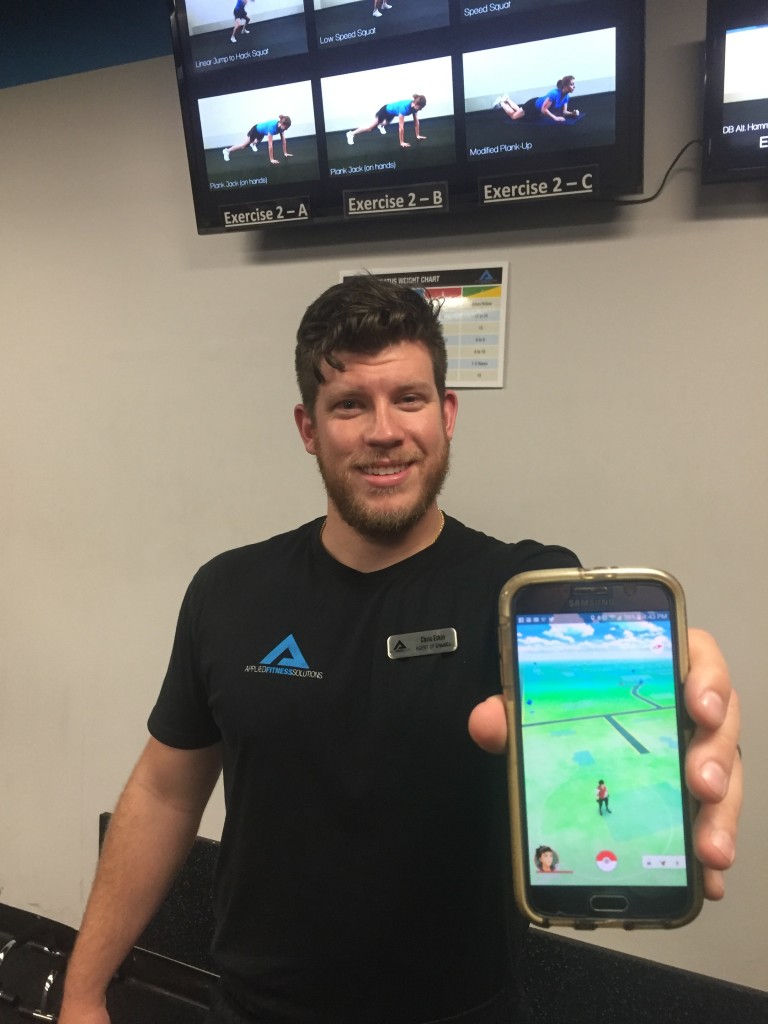What exactly is it?
Ok, so first things first. Surely many of our readers are seeing the headlines but might not have a full grasp of what exactly this game is or what the interface is like. Pokémon Go or “PG” for short, is a free downloadable app for iOS and Android devices. The gameplay works by using your phone’s GPS for your physical location and then uses “augmented reality” to take you through a virtual world searching for pokémon. As you travel around by foot, skateboard, bike, etc..little pokémon creatures pop up on your phone screen and actually integrate into the image of your physical surroundings!

You can then capture the pokemon by swiping your finger and “tossing” a pokéball. The goal of the game is to “catch em all” as the famous tagline suggests, but a more thorough explanation on what to do once you catch them can be found here.
Why is this game so popular?
Although it sounds counter-intuitive that a video game could be a social tool, that’s the reality with PG. Gaming on this platform is bringing people together in ways that Facebook, MySpace, and Twitter have failed to do…in person! As said above, the game requires you to travel around to “catch ‘em all.” With so many people participating (PG surpassed twitter in daily active users in just 3 short weeks), the likelihood of running into individuals pursuing the same goal is quite high! I know, I know, people are still on their phones during this game; but it’s a step in the right direction! People are out of their houses, they’re talking to each other, and they’re finding common ground. My neighborhood actually looks alive for once! I haven’t seen this since I met my friend Pat out on the playground during recess in 1995, haha!
What does this have to do with fitness?
Now, let’s get to the big question…How can we use this tool to help reach our health and fitness goals? Well, as a practitioner, I view this game not only as an awesome gateway to my cherished childhood, but also as a tool to help elicit habit change. Many people that previously couldn’t find time to go out for that 30 minute walk on days between their exercise classes are now out and about almost everyday in hot pursuit of the next pokémon. Psychologists have stated that it takes 21 days to make or break a habit. With this game being at that 3 week mark since its rollout, the habit is being made. Once the media attention and “fad effect” of this game begins to die down, some of the time that has been carved out of schedules to get up and move will not. The excuses will continue to dwindle down, and who knows, maybe that extra day of walking will blossom into something more!
Now… go to the app store, download Pokémon GO, and start catchin’…I mean changing your lifestyle! Just don’t let me catch you chasing pikachus in my classes 😉

About the Author:
-

Michael Stack is the founder & CEO of Applied Fitness Solutions and Frontline Fitness Pros. He is a faculty lecturer for the University of Michigan’s School of Kinesiology. He is also the creator and the host of the Wellness Paradox Podcast, produced in conjunction with University of Michigan.
Michael is an exercise physiologist by training and a health entrepreneur, health educator, and fitness industry advocate by trade. He is dedicated to enhancing the standard of practice of, and advocating for, fitness and wellness professionals to ensure they become an essential constituent in the healthcare delivery system.
With a career spanning over three decades in fitness, health, and wellness Michael has a deep knowledge of exercise physiology, health/wellness coaching, lifestyle interventions to mitigate chronic disease and leadership. He is credentialed through the American College of Sports Medicine (ACSM) as an Exercise Physiologist (ACSM-EP), Exercise is Medicine practitioner (ASCM-EIM), and a Physical Activity in Public Health Specialist (ACSM-PAPHS). Michael is a National Strength & Conditioning Association (NSCA) Certified Strength & Conditioning Specialist (CSCS), and a CDC Diabetes Prevention Program (DPP) Lifestyle Coach.
Michael received his undergraduate degree from the University of Michigan’s School of Kinesiology in 2004 and is currently a Master’s of Public Health (MPH) candidate at University of Michigan, with a specific concentration in health behavior and health education.
Michael is a board of directors’ member for the Physical Activity Alliance and Michigan Fitness Clubs Association. He sits on the University of Michigan’s School of Kinesiology Alumni Board of Governors. Michael is an expert curriculum reviewer for the American College of Lifestyle Medicine. Finally, he is a member of the executive leadership team for American Heart Association’s Heart Walk.
Michael lectures nationally for several health/fitness certification and continuing educations, including; IHRSA, the Medical Fitness Association, the National Strength & Conditioning Association, and SCW Fitness.

